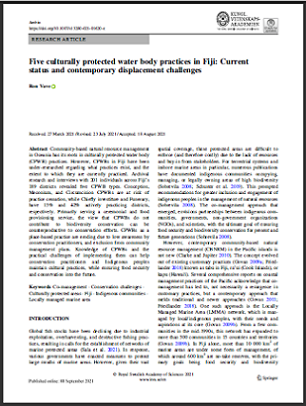
Community-based natural resource management in Oceania has its roots in culturally protected water body(CPWB) practices. However, CPWBs in Fiji have been under-researched regarding what practices exist, and the extent to which they are currently practiced. Archival research and interviews with 201 individuals across Fiji’s189 districts revealed five CPWB types. Conception, Meconium, and Circumcision CPWBs are at risk of practice cessation, while Chiefly investiture and Funerary, have 15% and 42% actively practicing districts, respectively. Primarily serving a ceremonial and food provisioning service, the view that CPWBs do not contribute to biodiversity conservation can be counter productive to conservation efforts. CPWBs as a place-based practice are eroding due to low awareness by conservation practitioners, and exclusion from community management plans. Knowledge of CPWBs and the practical challenges of implementing them can help conservation practitioners and Indigenous peoples maintain cultural practices, while ensuring food security and conservation into the future.














